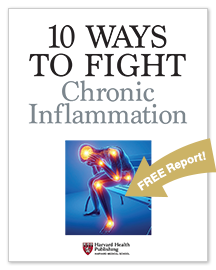Getting your omega-3s vs. avoiding those PCBs.—The Family HealthGuide
By now, nearly everyone has heard of the health benefits of the omega-3 fats found in fish. The most persuasive studies show that they protect against the serious — and sometimes fatal — episodes of an irregular heart rhythm that can cause sudden death. Other research indicates that a diet rich in omega-3 fats may lower your risk for heart attack and stroke.
Farm-raised salmon is one of the better sources of omega-3s. A 6-ounce serving contains about 3½ grams which is much more than in other popular fish. There's no straight answer to whether farm-raised or wild salmon has more omega-3 fat—it depends on what they eat. Today about half of the salmon sold worldwide comes from fish farms.
Risks from PCBs
Polychlorinated biphenyls (PCBs) are oily, synthetic chemicals that were used in electrical equipment and as additives to paint, plastics, and other products. Unfortunately, they're now found in today's farm-raised salmon. The federal government ordered industry to stop making them in the 1970s, but they still get freshly released into the environment from hazardous waste sites, leaks from old equipment, and incinerators. PCBs also stick to soil and sediment and can travel long distances through the air. They also "bioaccumulate" in fat, so concentrations tend to be higher in animals — like salmon and marine mammals like seals — that are further up the food chain. High doses kill fish, and PCBs have been linked to reproductive and immunological problems in several species of wildlife.
How great a risk they pose to human health is debated. The Environmental Protection Agency (EPA) has classified PCBs as probably causing cancer in humans. But several studies that have looked for a PCB-cancer connection haven't found one. Research has shown that babies born to women exposed to high levels of PCBs are more likely to have neurological problems and developmental delays.
PCBs in farm-raised salmon
The PCBs in farm-raised salmon come from the feed, which is made from smaller fish like herring and anchovies. Previous research had hinted at a problem, but a study in the Jan. 9, 2004, Science made a big splash because it was much larger (700 salmon samples) and was published in a prestigious journal. The study found that the PCB concentrations in farm-raised salmon were, on average, almost eight times higher than the concentrations in wild salmon (36.63 parts per billion vs. 4.75). That was still much lower than the FDA limit of 2,000 parts per billion. But the EPA has stricter standards for limiting exposure to pollutants in fish. The researchers said if those guidelines were applied to farm-raised salmon, it would trigger an EPA warning not to eat any of the farm-raised salmon they tested more often than once a month.
Five take-home messages
What should you do? People have to balance the risks and benefits for themselves, but here are some thoughts on farm-raised salmon:
- The older you are, the greater your chance for cardiovascular disease, and the increased importance of omega-3s. That might tip the balance in favor of farm-raised salmon. But if you're pregnant, then the risks from PCBs loom larger and you may not want to take any chances, however slight. If you have a personal or family history of cancer, you might opt to eat only one to two servings of farmed salmon per month.
- If you're concerned about PCBs, don't eat the skin of the salmon or the fat directly underneath it. That's where the pollutant is most concentrated. But that may make you miss out on some omega-3s.
- The study in Science found that the least contaminated farm-raised salmon came from Chile and Washington State, and the most contaminated came from Scotland and the Faroe Islands between Norway and Iceland. So if you are worried about PCB contamination, you can ask where the salmon came from and buy accordingly.
- The salmon industry was critical of the study in Science and complained that it was being singled out. But nobody wants to eat PCBs. The study should prompt the industry to look for "cleaner" sources of feed.
Eating fish is generally a smart move for your health. Eating a variety of fish should limit your exposure to things like PCBs.
April 2004 Update
Disclaimer:
As a service to our readers, Harvard Health Publishing provides access to our library of archived content. Please note the date of last review or update on all articles.
No content on this site, regardless of date, should ever be used as a substitute for direct medical advice from your doctor or other qualified clinician.















